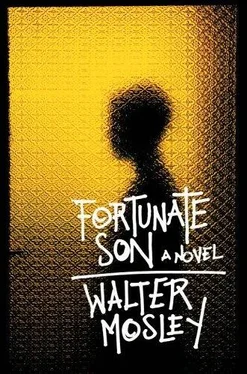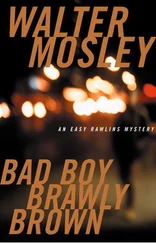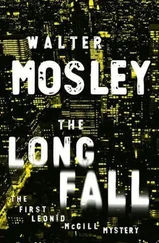“What would you think about?” Minas asked.
“You an’ Ahn an’ Eric,” Thomas said, “and my mother. I used to have a blank book and I’d write in that. I wrote mostly about nice things that people did for me and sometimes about why people was so mean. One man once told me that he thought that people were mean to the homeless because we were so poor. He said that people hate poor people in America... Oh, oh, yeah.”
“What?” Minas asked.
“I just remembered what I wanted to tell Eric when I got shot.”
“What’s that?”
“I was lookin’ at a book that had the word America written down on it. And I was lookin’ at it, and then I saw that E-R-I–C was right in the middle of it. Eric was in the middle of America.”
Minas put down his drink and lowered his head, pondering the words from his stepson.
“You want to go to the Rib Joint for dinner?” he asked.
“Yeah.”
In the past six years Thomas had shambled past the restaurant from time to time. Fontanot had bought the buildings on either side of the original eatery and added a second floor to the primary structure — you could smell barbecue smoking for three blocks in any direction. But Thomas never went in to say hello. The place was too big, and he doubted that his mother’s tall friend would remember him. And even if Fontanot did remember, Thomas knew that no one would let him just walk in. People dressed for street living were blocked from entering any place fancy, like restaurants or department stores.
Fontanot knew Thomas at first sight. He folded the young man in his arms and kissed his cheek.
“Boy, you are a sight for sore eyes,” he bellowed. “Look just like your mother. You sure do.”
They crowded into the kitchen and ate catfish and sausages. Thomas couldn’t eat too much, but he was happy at the loud entrepreneur’s special table.
Ira had married a big Texan girl named Coretta.
“Got some meat on her bones,” he told the doctor and his son. “But she ain’t fat. No, no — just bullheaded. When she told me she wanted to live together, I said that I wasn’t ready for that, so the next night when I got home she had all her stuff already moved in. I tried to th’ow her out an’ she rassled me to the floor. I couldn’t break her grip ’cause I was laughin’ so hard. Now, you know if a girl gonna make you laugh like that then it’s all ovah. We got married in Vegas the next weekend.”
Thomas didn’t remember ever feeling so happy or so safe as he did in Fontanot’s kitchen.
“Mr. Fontanot?” Thomas said after many stories.
“Yeah?”
“Do you think you might have a job here that I could do? I have washed dishes for men’s shelters before, and I know how to clean up.”
“I could use a good man on my smokers,” the big man said. “You know, I only put men I could trust out in the backyard.”
“You can trust me.”
“Then you can start tomorrow.”
That night Thomas was sitting on his old bed (Eric had moved back to his original bedroom) thinking about working for Fontanot. At the Rib Joint he felt that he could make a new life and maybe things would be all right. He’d have a job, and no one was looking to put him back in jail; he could get a license to drive and maybe even get a used car. That way he’d have an ID with a picture and an address. And then he could take a train back East and visit Clea at NYU when Fontanot gave him vacation. Maybe even Monique’s husband would shake his hand and smile.
The knocking at his door was very soft.
“Come in,” he said, knowing that it was Ahn.
The nanny-turned-housekeeper had on a boy’s blue jeans and T-shirt. She also wore round wire-rimmed spectacles.
Thomas glanced at the hem of the T-shirt to see if there were old bloodstains there, but all he saw was bright white cotton.
“Hello, Tommy,” she said, leaning forward slightly with just a hint of a bow.
Tommy moved toward the end of the bed, and she sat next to him.
“Are you okay?” she asked.
“Yes. I’m going to work for Mr. Fontanot. I’m gonna be a rib smoker.”
“Dr. Nolan and Eric tell me that you were shot one time before,” she said, frowning.
“A long time ago. I don’t hardly ever even think about that.”
“Was that before you called me?”
“No. I got shot later.”
“I could have saved you, maybe?”
“Prob’ly not, Ahn. I was in trouble, and nobody could have got me out. You know, it’s tough in the streets of L.A. I knew this guy once from down in Mexico, illegal, you know. And he told me that if he was sick he’d be better off at home because down there there was always somebody to give you some beans an’a tortilla, someplace to sleep at least.”
“But I could have fed you then. But I told you not to call.”
“It’s okay, Ahn. Really. I always remembered what you told me about running. No matter what happens you got to keep on movin’. You can’t stop to cry or wonder why or nuthin’. I got that from you, Ahn, and that’s why I stayed alive.”
The small woman and Thomas hugged there on his childhood bed. She was crying. Thomas remembered all the times that he and Eric had run to Ahn with cuts and scrapes and bruises. She would always be there, ready to take care of them.
“It’s okay, Ahn,” Thomas whispered. “We don’t have to run anymore.”
When Ahn left for her room, Thomas went down into the garden. He was barefoot and wore only his black jeans. In that way he remembered his mother and their nocturnal sojourns in the garden when Eric and Dr. Nolan were away. He expected to be alone, but he found Raela there, sitting on the stone bench.
“Hello,” the teenager said.
Thomas liked this girl. She seemed to him to hold herself like ballet dancers that performed in the park in the summer. It was the way she held her head high and how her eyes took a moment to settle on you. He grinned and sat down next to her.
“What are you doing down here?” he asked.
“When Eric falls to sleep sometimes I come down to sit with the flowers,” she said.
Thomas nodded.
“Eric told me that my stepfather wanted you to work for him but you said no.”
He nodded again, breathing in the strong scent of far-off night-blooming jasmine.
“Why did you say no?”
“Because...”
“What?”
“Because he made my eyes hurt when I looked at him.”
It was Raela’s turn to nod.
For long minutes they sat not talking. Now and then the flutter of a nightbird or some large moth broke the silence.
“He loves me too much,” the girl said after a while. “When I was a kid he’d come and watch me play. He would talk to me for hours but never even pay any attention to my brother at all.”
“I knew a woman once who told me that her father made her have sex with him,” Thomas said. “That’s why she ran away and lived in the street. He said he’d kill her if she even went out with a boy. He had killed another daughter and put her in the basement, but she never told no one except us in the street.”
“He never touched me,” Raela said. “And he never made threats. But I think he hates Eric — he hates him because we’re together.”
“Yeah,” Thomas said, nodding again. “Maybe that’s why he hurts my eyes.”
“I told Eric not to work for him. I told him that my stepfather is like a big old stone. He just falls on top of you and stays there until you’re crushed. When I was younger he would tell me about how he would sometimes just sit with a man at lunch, and by teatime the man would have lost everything it took him his whole life to make. I’d ask him why the man didn’t shoot him.”
“What did he say?” Thomas asked, scared as if he were being told a ghost story.
Читать дальше












